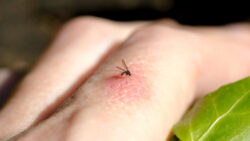Florida is a haven for sunshine, outdoor activities, and unfortunately, mosquitoes. These tiny insects can quickly turn a pleasant evening into an uncomfortable ordeal, leaving you with itchy, irritating bites. While it’s impossible to eliminate mosquitoes altogether, there are several ways to protect yourself and your family from these pests. In this blog, we’ll explore when mosquitoes are most active, the best mosquito repellents, mosquito repellent plants, and effective strategies for preventing bites.
When Are Mosquitoes Most Active?
Mosquitoes are most active during dawn and dusk, particularly in warm, humid environments like Florida. They thrive in areas with standing water, such as ponds, bird baths, and clogged gutters, which are ideal breeding grounds. However, some species of mosquitoes can bite throughout the day, especially in shaded or forested areas.
If you’re planning to spend time outdoors during these peak mosquito hours, it’s essential to take extra precautions to minimize the risk of bites.
Effective Mosquito Repellents
One of the most reliable ways to protect yourself from mosquito bites is by using mosquito repellents. There are various options available, ranging from chemical-based products to natural alternatives.
1. Chemical-Based Mosquito Repellents
The best mosquito repellent products typically contain active ingredients that have been proven to repel mosquitoes effectively. These include:
- DEET: One of the most common and effective active ingredients, DEET provides long-lasting protection from mosquitoes. It’s ideal for outdoor activities like hiking or camping.
- Picaridin: A less greasy alternative to DEET, picaridin offers comparable protection and is less likely to cause skin irritation.
- Oil of Lemon Eucalyptus: For those seeking a natural mosquito repellent, oil of lemon eucalyptus is a plant-based option that has shown effectiveness comparable to low concentrations of DEET.
When applying any mosquito repellent, make sure to follow the instructions on the label. Repellents are most effective when applied to exposed skin and clothing, but avoid applying them to your face or near your eyes and mouth.
2. Natural Mosquito Repellents
If you prefer to avoid chemical repellents, several natural mosquito repellent options are available. Essential oils like citronella, lavender, and tea tree oil are commonly used as natural mosquito repellents. However, these may not provide the same level of protection as chemical-based options and may need to be reapplied more frequently.
Mosquito Repellent Plants
Did you know that certain plants can help repel mosquitoes from your yard? Planting mosquito repellent plants around your home can create a natural barrier that deters mosquitoes from coming too close. Here are some of the best mosquito repellent plants to consider:
- Citronella: Known for its strong, lemony scent, citronella is a popular natural mosquito repellent. You can plant it in your garden or use citronella candles to keep mosquitoes at bay.
- Lavender: The pleasant fragrance of lavender is not only relaxing for humans but also repels mosquitoes.
- Marigolds: These bright, colorful flowers contain pyrethrum, a compound used in many insect repellents.
- Basil: This aromatic herb can double as a cooking ingredient and a mosquito repellent when planted in your garden or placed in pots around your outdoor space.
By planting a variety of these mosquito repellent plants, you can enhance the natural defense of your yard against mosquitoes.
Preventing Mosquito Bites
To maximize your protection from mosquitoes, consider combining several strategies to minimize your exposure to these pests.
1. Eliminate Standing Water
Since mosquitoes lay their eggs in standing water, removing stagnant water sources around your home is critical for mosquito control. Check for and empty containers like flowerpots, bird baths, clogged gutters, and anything else that could collect rainwater. Keeping your yard dry can significantly reduce the mosquito population.
2. Wear Protective Clothing
When mosquitoes are particularly active, wear long sleeves, long pants, and socks to minimize exposed skin. Light-colored clothing is less attractive to mosquitoes than dark colors, and treating your clothing with a repellent like permethrin can provide an extra layer of defense.
3. Install Window Screens
Ensure that your windows and doors are properly screened to keep mosquitoes out of your home. Regularly inspect and repair any holes or tears in screens to prevent mosquitoes from sneaking indoors.
Contact a Mosquito Control Company
While these methods can help protect you from mosquito bites, sometimes professional mosquito control is necessary for long-term relief. A mosquito control company can help identify problem areas around your property and implement effective solutions, such as barrier treatments, to reduce mosquito populations. These treatments can provide ongoing protection from mosquitoes and ensure your outdoor spaces remain enjoyable.
If you’re struggling with mosquitoes in your yard, consider reaching out to a mosquito control company for professional advice and services.


